JournalismPakistan.com | Published December 07, 2018
Join our WhatsApp channel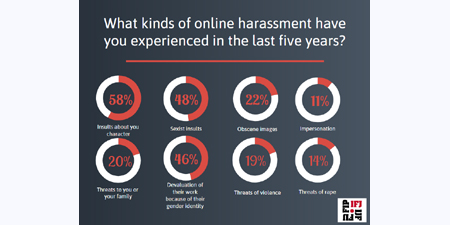
BRUSSELS – Sixty-six percent of the women journalists who were victims of online harassment suffered attacks based on their gender, according to the findings of a survey conducted by the International Federation of Journalists (IFJ).
The results also reveal that while half of these attacks were reported, in just 13% of the cases was the harasser identified or brought to justice.
Online harassment affects both male and female journalists. However, initial results from the IFJ survey found that online abuse has a massive impact on women journalists - it affects almost two-thirds of them - causing psychological trauma and leading to self-censorship, among other effects.
The new findings reveal that online harassment directed towards women journalists is mainly based on their gender - sexist insults, humiliation because of their physical appearance, rape threats among other gender-based attacks - while online abuse against male journalists is not.
Forty-eight percent of women respondents confirmed that they received sexist insults and 46% of them said the comments devalued their work because of their gender identity. In addition to this, 22% of women journalists received obscene images from unknown individuals and 14% of them were victims of rape threats.
Myriam Leroy, a Belgian freelance journalist who told the IFJ about her case “received thousands of insults and rape threats and hundreds of death threats. All of them, always, had a sexual connotation”.
Another alarming conclusion of the survey is that a huge majority of these attacks go unpunished. Only half of the victims of online abuse (53%) reported the attacks to their media management, union or police, and in 2 in 3 cases nothing happened.
“I have so many women writing to me that they have left Twitter and other social media after numerous attacks. They felt unprotected out there”, said Alexandra Pascalidou in one of our testimonies, a statement that the survey confirms.
Seventy-five percent of the women journalists subject to online harassment who did not report these attacks did not do it because they felt it was not going to make a difference, while 23% did not want the situation to affect their work. It is worrying that women journalists are getting used to dealing with online harassment by themselves and assuming these situations as “common.”
One of the main objectives of online harassers is to silence journalists. Many women facing such situations resort to self-censorship.
Laura Crespo, a young Spanish journalist, suffered continual online abuse from an individual who did not want her to report on women’s football. Something similar is suffering Noelia Díaz, a Paraguayan journalist, who is currently harassed for posting on feminism. Both continued with their reporting despite the threats.
However, not all women journalists do it. Thirty-eight percent of women respondents who were subject of online abuse admitted to self-censorship. This is not only a serious problem for victims but the whole society: the fundamental right to freedom of information is threatened when journalists self-censor.
IFJ General Secretary Anthony Bellanger said: “Social media must be a space where all journalists can express their opinion and publish their work freely and without fear. We demand existing laws are enforced, and that where necessary new laws adapted to the digital age are enacted to defend victims of online abuse and make harassers accountable for their crimes. We demand that employers take seriously complaints made, have proper procedures to enable reporting of harassment and act to stop the abuse”.
IFJ Gender Council Co-Chair Mindy Ran said: “These testimonies clearly show the abuse of power and violation of fundamental rights and freedom of the press. The rampant silencing of female journalists and hounding of those brave enough to stand in the face of such sexualized and serious threats must be acknowledged with more than (almost) blanket immunity for these crimes.”
At the same time, online violence also has a psychological impact. The majority of abused respondents said these attacks had had psychological effects such as anxiety, fear or stress (63%). Belgian journalist Florence Hainaut suffered this fear. “The guy was more and more worrying, I was scared. At the time, I used to wake up at 2:30 am to go to work. For several weeks, I only went out of my house with a knife.” – IFJ media release
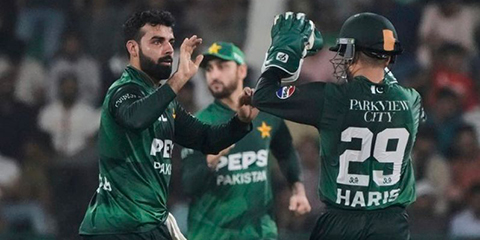
June 11, 2025: Pakistan celebrated a narrow win over Bangladesh, but beneath the jubilation lies a deeper crisis—from sidelined veterans to a collapsing domestic structure—signaling an urgent need for cricket reform.
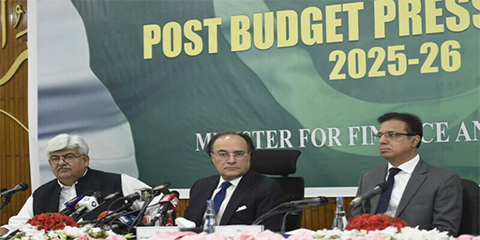
June 11, 2025: Journalists walked out of the post-budget press conference in Islamabad to protest the absence of a technical briefing and the government's dismissive behavior, calling it unacceptable and intolerable.
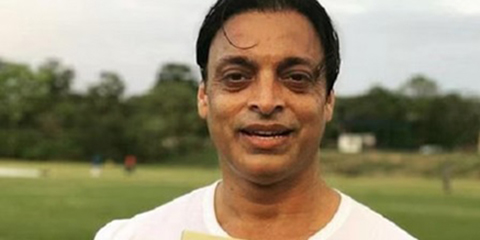
May 31, 2025: Dr. Nauman Niaz has issued a defamation notice to Shoaib Akhtar over derogatory remarks made during a recent broadcast, reigniting a longstanding media feud between the two prominent figures in Pakistan.

May 30, 2025: The Human Rights Commission of Pakistan has demanded the full repeal of PECA, citing its vague language, coercive powers, and threats to free speech and digital rights in Pakistan.

May 30, 2025: The Pakistan Federal Union of Journalists (PFUJ) has condemned the murder of journalist Syed Mohammed Shah in Jacobabad, calling for urgent justice and improved safety for media professionals in Sindh.

May 26, 2025: In Rawalpindi, police allegedly side with Jang Group to block 66 reinstated employees from resuming work despite court orders, drawing sharp criticism from unions and press freedom advocates.

May 25, 2025: PFUJ condemns the Jang Group's decision to dismiss over 80 employees in Rawalpindi, calling it an 'economic massacre.' The union warns of nationwide protests if workers are not reinstated.
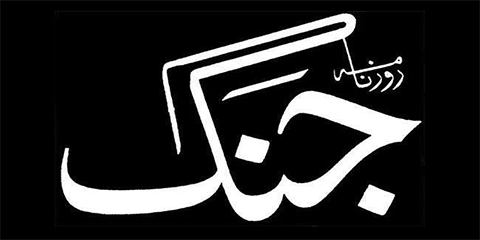
May 25, 2025: Daily Jang Rawalpindi has terminated over 80 employees, including female staff, despite multiple court rulings in their favor—raising concerns over labor rights violations and misuse of authority in Pakistani media.
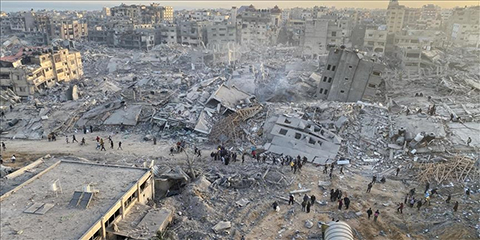
May 19, 2025 PJS reports 219 Palestinian journalists killed in Israeli attacks since October 7, with 30 women among the victims. Over 430 were injured and 685 family members were killed. Read more on the systematic targeting of media in Gaza.

May 15, 2025 Discover the legacy of Samiullah Khan, Pakistan’s legendary "Flying Horse," whose breathtaking speed and artistry redefined hockey. From Olympic glory to World Cup triumphs, his story is one of myth, movement, and magic.
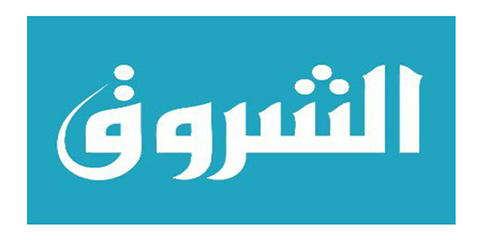
May 04, 2025 Algerian authorities suspend Echorouk News TV for 10 days after it used a racist slur against African migrants. ANIRA demands an apology, calling it a violation of human dignity.

May 04, 2025 NCHR and MMfD launch a journalism fellowship to train reporters on digital rights & gender inclusion in Pakistan. Supported by UNESCO, this initiative aims to bridge the gender digital divide. Apply by May 15, 2025!
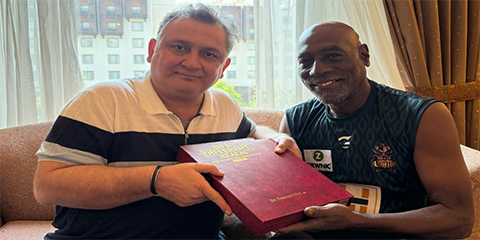
April 23, 2025 Discover Dr. Nauman Niaz’s In A Different Realm: Story of Quadruple & Triple Centuries 1876–2025, a profound exploration of cricket's most monumental innings, blending historical analysis with poetic narrative.